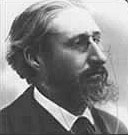| Profile | Major Works | Resources |
Charles Gide, 1847-1932.
Economist of the French historical school and socialist activist.
Charles Gide was born to a prominent Huguenot family in southern France (he was the uncle of Andre Gide). He took his degree at Paris, with a dissertation on the legal rights of religious associations. After the reorganization of the law faculties of France, in 1878, Gide took up the new chair in political economy at Bordeaux. He would soon decamp for the law faculty at Montpellier, which would remain his perch for the next couple of decades.
Charles Gide simultaneously carved a career as a social activist. He would become a theoretician and proselytizer of "Protestant socialism" (a.k.a. as the "Nimes School"), or, as he characterized it, the "school of solidarity", which he placed as the only tractable medium between the "school of authority" of Catholic socialism, the "school of liberty" of the classical liberals and the "school of equality" of revolutionary socialism. Gide's activities in the Nimes circle brought him into contact with the cooperatives movement, which Gide quickly and wholeheartedly embraced and would become a lifelong advocate.
Charles Gide was a proponent of the historical approach to economics. He was receptive of the work of Léon Walras, albeit less because of his economics and more because of their shared social philosophy. With Walras's encouragement, Gide launched the influential Revue d'économie politique, as a heterodox counterweight to the publishing dominance of the French Liberal school. Gide's 1883 Principes would become the leading principles textbook in France for a couple of generations, and his textbook on the history of economic doctrines with Charles Rist (1909) an international success.
In 1899, Gide began teaching social economics at the law faculty of Paris, resigning from his Montpellier chair in 1906 in favor of Charles Rist. While in Paris, Gide continued his tireless activities on behalf of the cooperative movement, authoring numerous newspaper articles and chairing about as many project committees on cooperatives, people's universities, garden cities, hygiene and more. In 1921, Gide breached the liberal citadel of the College de France, teaching courses there on the theory and history of cooperation, in a chair endowed by the cooperative societies.
|
Major Works of Charles Gide
|
|
HET
|
|
Resources on Charles Gide
|
All rights reserved, Gonçalo L. Fonseca

